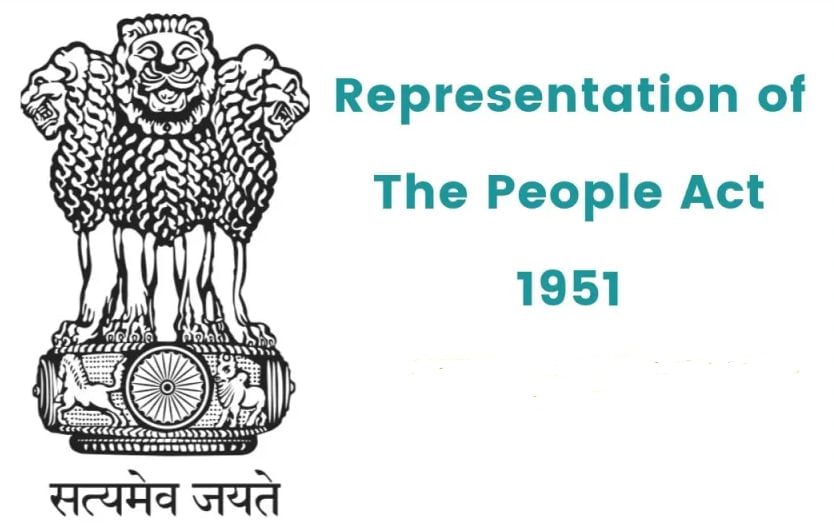Description

Copyright infringement not intended
Context: The Supreme Court of India stated that Indian voters don’t vote for a candidate based on their educational qualifications and, therefore giving false information about the qualifications by an electoral candidate cannot be considered a “corrupt practice” under Sections 123 (2) and Section 123 (4) of the Representation of People’s Act, 1951.
‘Corrupt Practices’ under the RPA, 1951
- Section 123 of the Representation of the People (RPA) Act defines ‘corrupt practices’, it includes bribery, undue influence, false information, and promotion or attempted promotion of “feelings of enmity or hatred between different classes of the citizens on grounds of religion, race, caste, community, or language” by a candidate.
- Section 123 (2) of the Act deals with ‘undue influence’ which it defines as “any direct or indirect interference or attempt to interfere on the part of the candidate or his agent, or of any other person, with the consent of the candidate or his election agent, with the free exercise of any electoral right.”
- This also includes threats of injury, social ostracism and expulsion from any caste or community.
- Section 123 (4) of the Act extends the coverage of “corrupt practices” to the intentional publication of false statements which can prejudice the outcome of the candidate’s election. Under the provisions of the Act, an elected representative can be disqualified if convicted of certain offences;
- On grounds of corrupt practices.
- For failing to declare election expenses.
- For interests in government contracts or works.
.jpeg)
What practices have been declared corrupt practices by the court in the past?
- In 1994, the Supreme Court’s ruling in the ‘SR Bommai v. Union of India’ case mentioned that “whatever the attitude of the State towards the religions, religious sects, and denominations, religion cannot be mixed with any secular activity of the State.”
- The court clearly said that the encroachment of religion into secular activities is strictly prohibited.
- In 2017, a 7-judge constitution bench of the Supreme Court in ‘The Abhiram Singh v C.D. Commachen’ case held that an election will be annulled if votes are asked in the name of a candidate’s religion, race, caste, community, or language, as per the Section 123 (3) of RPA 1951 which prohibits the same.
- However, one of the judges said that “To hold that a person who seeks to contest an election is prohibited from speaking of the legitimate concerns of citizens that the injustices faced by them based on traits having an origin in religion, race, caste, community or language would be remedied is to reduce democracy to an abstraction.”
- In 2022, the Supreme Court directed a 3-judge bench to look into the 2013 judgment in ‘S. Subramaniam Balaji vs State of Tamil Nadu’, where the court held that promises of freebies cannot be termed a corrupt practice.
Representation of the People Act, 1951
- The Representation of the People Act, of 1951, pertains to the conduct of elections for the Houses of Parliament and the Houses of the Legislature of each state, from the notification of elections to the resolution of election disputes.
- The Act specifies the procedures to be followed by the Election Commission of India (ECI), an autonomous Constitutional body that administers national and state elections.
- The Act mentions what qualifies or disqualifies a candidate from contesting elections; defines corrupt practice; mandates the registration of political parties; and stipulates the procedure for the nomination of candidates, polling and the declaration of election results.
- The Act also confers the right to vote on every person whose name is on the electoral roll.

Important Provisions of the Representation of the People Act, 1951
- Section 8 of this Act states that a person convicted of any offence and sentenced to at least 2 years of imprisonment shall be disqualified from contesting elections for 6 years from the date of the conviction.
- As per Section 20 of the Act, the chief electoral officer of each state supervises the conduct of the elections in that state under the supervision and direction of the ECI.
- Section 21 states that the ECI can appoint a returning officer who is responsible for overseeing the electoral process in one or more constituencies.
- As per section 27, the ECI can depute a presiding officer to conduct the poll at a polling station.
- Section 29B of the Act states that a registered political party can accept a contribution that is offered voluntarily by a person or a private company.
- Section 29C says that a political party is required to disclose only those contributions that are more than Rs. 20,000.
- Section 33 says a person cannot contest elections from more than two constituencies for the Parliament as well as the Legislature.
- Section 39A of the Act states that the ECI must allocate equal time slots to political parties (recognised by the ECI) on cable television networks and other electronic media to display messages related to the election or to address the public.
- Section 80A states that the High Court will try any petition related to the election or to election disputes arising in that court’s jurisdiction.
- Section 135C of the Act prohibits the sale and distribution of liquor at a public or private hotel, eating house, tavern, shop or any other place in the polling area for 48 hours before the polling ends.
- Any person who violates this provision can be imprisoned for up to six months and/or fined up to Rs. 2,000.


Must Read: https://www.iasgyan.in/daily-current-affairs/disqualification-of-legislators
https://indianexpress.com/article/explained/explained-law/corrupt-act-representation-of-people-act-1951-8459915/












